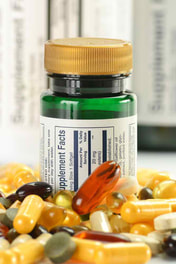 When talking about health supplements or medications, you may hear the term "enteric coating". This term is in reference to the substance (usually made from fatty acids, shellac, waxes or plastics) that is applied to certain oral medications/supplements, which creates a barrier to prevent irritation of the stomach by the drug, and protects the drug from stomach acid. The word enteric refers to the small intestine, so when a product is enteric coated, it means that it is meant to be absorbed in the small intestine, and NOT in the acids produced by the stomach during the digestive process. Aspirin, for example, can have an irritating effect on the stomach, so it is coated with a substance that will only dissolve in the small intestine. The coatings work by creating a surface that is stable at the highly acidic pH found in the stomach, but breaks down rapidly at a less acidic (basic) pH. Meaning they will not dissolve in the acidic juices of the stomach (pH ~3), but they will in the higher pH (above pH 5.5) environment present in the small intestine. As a distributor of Neprinol and other enzyme supplements, we have dealt with many products from different manufacturers over the years that claim to be enteric-coated. Many of them probably do coat some of their raw materials, but is it really necessary when you're talking about enzymes?
We recently spoke with a rep from a company that enterically coats products, and he ran down the process of enterically coating a raw material for me. He explained that a raw material is in itself too small to coat typically, so they have to turn it into a tablet first, then crush it down to the smallest size they can. He said that if the raw material does not appear different than its pre-coated appearance, then the presence of an enteric coating that would actually work is unlikely. The material used is in itself a solid in powder form, and turned into a liquid during the coating process. He said the coating material, as a solid, could be added to an enzyme raw material to bring a positive test result back for the presence of an enteric coating, but would not add any value nor would it provide protection from acidity being mixed as such. According to Howard F. Loomis D.C., *"There is a great deal of misinformation concerning the destruction of supplemental enzymes by hydrochloric acid (HCl) in the stomach. I speak with practitioners every week who are under the impression that HCl is constantly present in the stomach. This, of course, is not true," he states. "It takes 30 to 60 minutes for the body to concentrate the amount of acid in the stomach, if it can do it at all. Acid production occurs in response to stretching of the stomach wall by the presence of food." Loomis continues by saying, "When we supplement enzymes because of an inflammatory reaction, we should do so on an empty stomach and there is no need to worry about acid production in the stomach. If we supplement with meals, the enzymes will be used in the digestion of food and are not available to the immune system. This means that using enteric-coated enzyme tablets between meals to protect the enzymes from HCl is a waste of time and money," Loomis says. "Besides, enzymes lose from 40% to 60% of their potency by being compressed into tablet form!" This does not mean that enteric coating is an unnecessary process all of the time. As a matter of fact, it's quite the contrary. Aspirin, as mentioned above, can be coated to avoid the irritating effect on the stomach. Similarly, many fish oil supplements are now using enteric coating to prevent the fish oil capsules from being digested in the stomach, which can cause a 'fishy' reflux. Other medications and supplements require the coating to avoid the stomach's acidic exposure, so they can pass through to a more basic pH environment (the small intestine), and serve their purpose throughout the body. Source: *The Chiropractic Journal, "Subluxation-Based Nutrition: Inflammation and Enzymes" by Howard F. Loomis
3 Comments
nyc
5/9/2015 04:21:45 am
Interesting, thanks. Just a nit, hydrochloric acid is HCl with a lower case L.
Reply
SW Nutra
5/11/2015 04:22:54 am
Thanks for the catch! Got it fixed.
Reply
Leave a Reply. |
(800) 959-8872 (M-F: 7am - 4pm PST)
Copyright © 2004-2024 Southwest Nutraceuticals. All Rights Reserved.
Privacy Policy | Terms of Service
*These statements have not been evaluated by the Food and Drug Administration. This product is not intended to diagnose, treat, cure or prevent any disease.
For all conditions or illnesses, see a healthcare professional for a full evaluation, diagnosis or treatment plan.
Prices are subject to change without notice.
Privacy Policy | Terms of Service
*These statements have not been evaluated by the Food and Drug Administration. This product is not intended to diagnose, treat, cure or prevent any disease.
For all conditions or illnesses, see a healthcare professional for a full evaluation, diagnosis or treatment plan.
Prices are subject to change without notice.

 RSS Feed
RSS Feed

